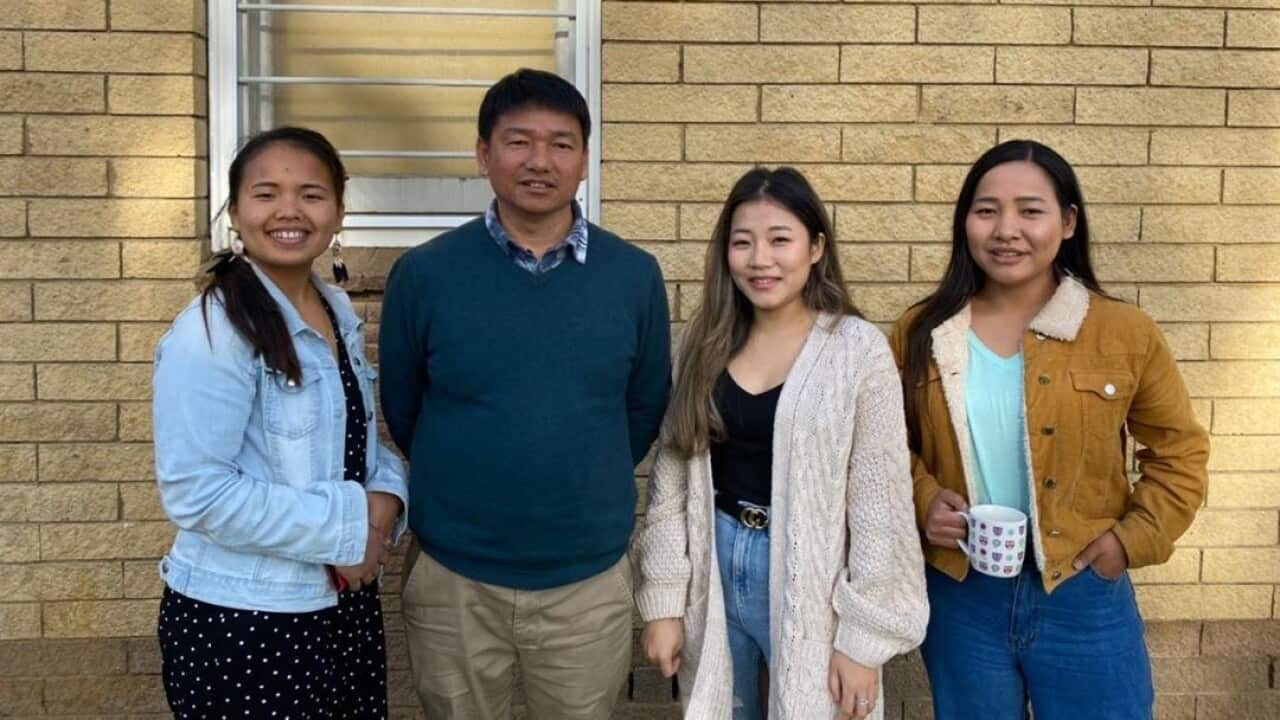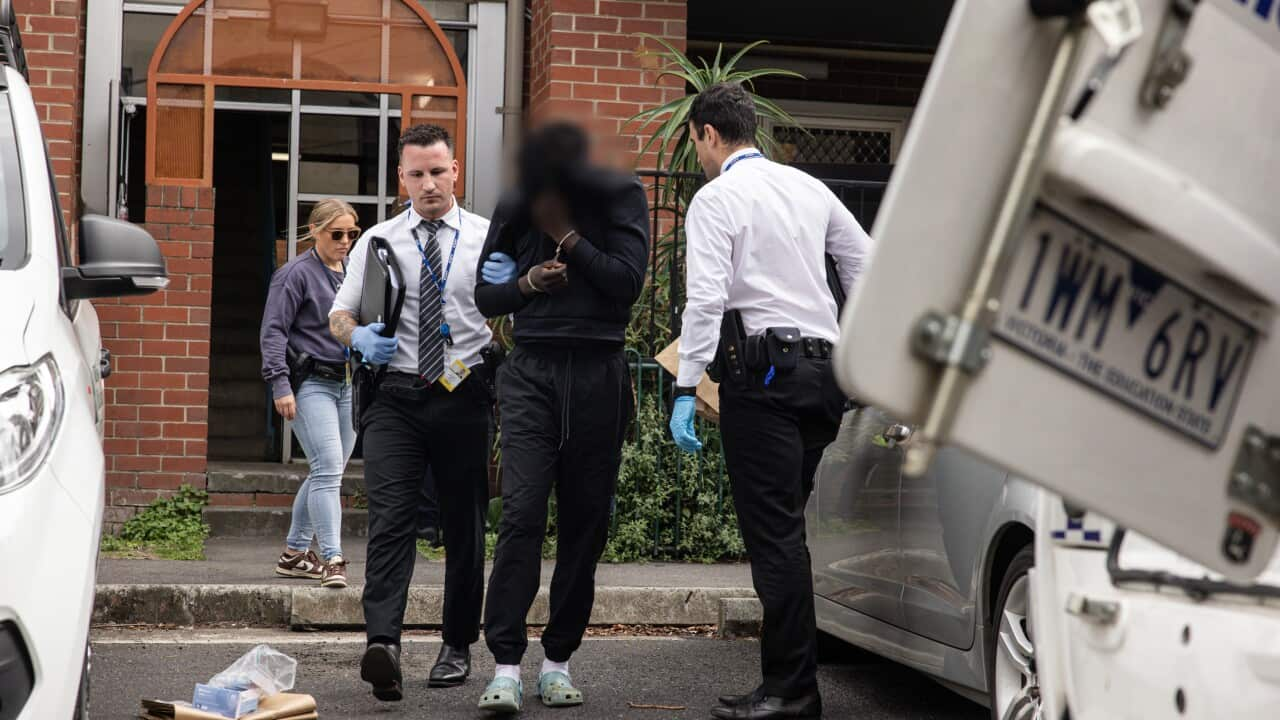Highlights
- Author Ashna Devaki Thapa has written a book about her grandfather’s journey to Australia
- Many Nepali-speaking Bhutani refugees have been resettled in Australia
- 'Australia gave us an identity,' says Ashna Thapa
After enduring 15 years of the seemingly-endless hardship at a refugee camp in Nepal, and with some convincing from his sons, Bhutani refugee Chandra Bir Thapa took up the United Nation’s offer of third country resettlement to Australia and moved here in 2013.
In remembrance of her grandfather, who passed away in 2019, Tasmania resident Ashna Devaki Thapa has written a book to chronicle the life of a person who was forced to live as a refugee multiple times in his life.
The book, titled My Grandfather’s Life Journey – A Nepali speaking Bhutanese refugee’s story, was also an effective tool for Ms Thapa to cope with the grief of her grandfather's death due to cancer at the age of 81.
“My grandfather was unsure and anxious about moving to Australia”, recalls the 22-year-old, adding that he was in doubt because "he did not want to go through the same struggle again after having faced discrimination as a refugee in Nepal."
“Despite being fellow Nepali speakers and sharing the same culture, the local community never accepted us as part of their own”, she told SBS Nepali.
“But once he reached Australia, he regretted not coming here earlier and it was indeed the best decision for him”, says Ms Thapa.

Writer Ashna Thapa with her grandfather, Late Chandra Bir Thapa. Source: Supplied
Chandra Bir Thapa was born in 1938 in a remote village in Bhutan. Growing up in a poor family, he never had the opportunity to get formal school education.
However, always willing to learn, he taught himself how to read and write.
Following the Bhutani government’s policy of ‘One Nation, One People’ in the early 1990s, Nepali speakers in the country were forced to "assimilate" and give up their language and culture or risk facing punishment.
In a government crackdown that followed, more than 100,000 people were expelled from the country, who later ended up in UN-supported refugee camps in Nepal for more than two decades.

Refugees empty a sac of rice inside one of the food storages of the World Food Programme inside Beldangi 2 refugee camp on March 12, 2015 in Beldangi, Nepal. Source: Omar Havana/Getty Images
“I was younger then, so I might not have understood the extent of the contempt people showed towards us. But it is difficult for me to explain in words what my parents and grandparents had to go through”, she laments.
From inadequate shelter during the rainy season, to depending on paracetamol tablets during various illnesses, the Thapas have seen it all.

Late Chandra Bir Thapa in Tasmania Source: Ashna Thapa
“My family had to leave behind their home and land and walk out of Bhutan as non-citizens. When even Nepal refused to accept us as citizens, we had to live without an identity for a long time”, she recollects.
Ms Thapa adds that her grandfather’s diligent and optimistic approach to life was her family’s main emotional support during their 15-year struggle in Nepal.
"I had never seen my grandfather panic. He always said that the true meaning of life lies in struggle and without struggle, there is no life," she says drawing a life lesson from her grandfather's life.

Illustrative image of a couple being resettled in Australia say goodbye to their relatives from the window of a bus on March 13, 2015 in Beldangi, Nepal. Source: Omar Havana/Getty Images
Coming to Australia
The UN agreement to resettle Nepali-speaking Bhutani refugees in a third country led to many landing up in the US, Europe, Canada and Australia. More than 6,000 such refugees now call Australia home.
In and around Nepal's refugee camps where the Thapa family lived, people had begun to plan and dream of a better life in another country.
Ms Thapa’s grandfather, however, did not want their family to move to another country. Having lost his first son early in life, he did not want to separate from his other five sons and grandchildren, around whom his life revolved.

Late Chandra Bir Thapa (centre) with his sons. Source: Supplied
By 2013, only his second and fourth sons, Tek Bahadur Thapa (Ms Thapa's father) and Khem Prasad Thapa, along with their families, were left in Nepal, while the others had found new life in America.
They now began to persuade their father about moving to Australia, who was already heartbroken over his family being scattered in different parts of the world, and the uncertainty of ever meeting them again.
When the date of their flight to Australia was announced, he agreed with a heavy heart, mindful that there were thousands of refugees before him who had taken the same path.

A group of young refugees play football on a field inside the Youth Friendly center funded by the UN High Commissioner for Refugees (UNHCR) in Nepal. Source: Omar Havana/Getty Images
She writes in her book: “We were all very emotional about leaving behind a place where we had lived for years. My uncle [Khem Prasad] had already flown to Australia with his family by then, and we were all worried whether or not we would get to meet them once we reach."
Her family first arrived in Melbourne, then boarded a flight to Hobart.
“After being welcomed by other friends and family who were already in Tasmania, my grandfather calmed down a bit. Our migration agent had arranged accommodation, food, health facilities and transportation," Says Ms Thapa.

Ashna (third from left) says is thankful to the Australian Government for the support provided to refugees. Source: Supplied
She now lives with her family in Hobart and works for the Australian Red Cross and Migrant Resource Centre, alongside pursuing a degree in social work.
The story behind the book
Ms Thapa remembers vividly her sense of hopelessness after losing her grandfather to cancer.
“I felt like I had lost my identity and I quit my job and left school because I couldn’t cope”, says Thapa.
“The day he passed away, the sky was gloomy since morning and there were light showers. We were all at home, and he was caressing my hands just a few moments before he took his last breath," she recalls.

Ashna's grandfather Chandra Bir Thapa (centre) was diagnosed with cancer in 2019. Captured with his son and daughter-in-law. Source: Supplied
“My grandfather wanted to publish his own book, so I decided to portray his knowledge, his inspiring attributes like patience and perseverance, and pass them on to the coming generations," Ms Thapa says.
She adds that he had taught himself to read and write by scribbling on rocks and mud.
“He had diaries written in Nepali, some pages of which have been published in this book," Ms Thapa notes in her work.
“After coming to Australia, although he didn't need to learn English, he used to learn a few alphabets from the teacher who taught my grandmother English. He was big nature lover, always interested in exploring and studying the new plants and trees," Ms Thapa says about her grandfather.
Ms Thapa says the bond between them got even stronger during in Australia.

Aashna Thapa with her grandfather. Source: Aashna Thapa
Ms Thapa says she has been giving back to the community in Nepal by sponsoring hostel and education costs for orphaned children in the district of Surkhet, west of Kathmandu.
“I do not have any other ‘big dream’ in life. My only major goals are to help these kids, serve the community where needed, and make my parents happy,” she adds.

Ashna Thapa with members of Nepali community Source: Ashna Thapa
She says, “I think we all can learn to treat everyone equally and not differentiate based on their skin colour, religion or birthplace. I still ask myself this question – are we all not the same?”
Ms Thapa is currently working to publish an English version of her book after receiving positive feedback for the Nepali version from people in Australia and overseas.









